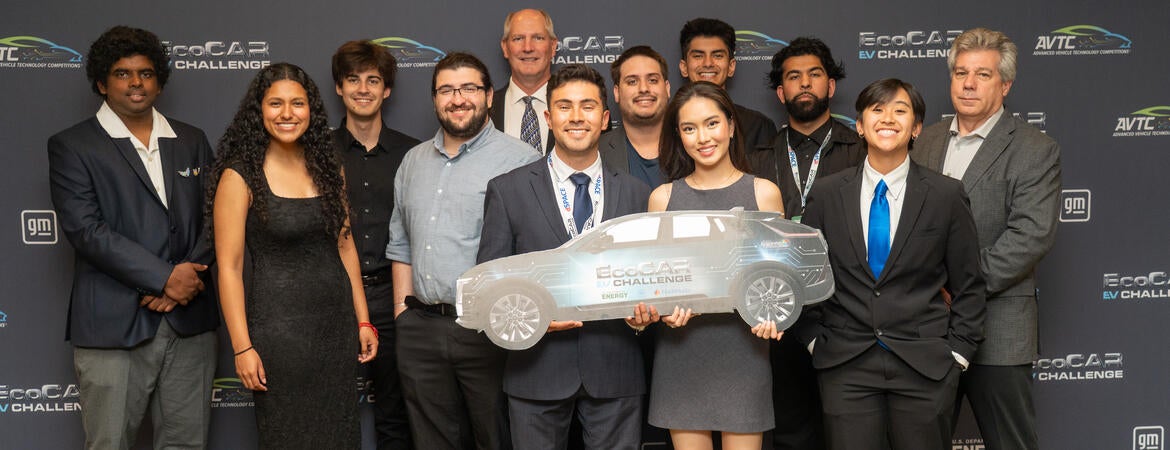
A Look Back at Year 3 Competition Milestones
In May, the UCR EcoCAR team traveled to Yuma, AZ and San Diego, CA for Year 3 of the EcoCAR EV Challenge, a national competition sponsored by the U.S. Department of Energy. Thirteen university teams and over 200 students took part in re-engineering a 2023 Cadillac LYRIQ, with 19 industry sponsors evaluating technical performance, project management, and innovation in vehicle electrification.
The UCR team earned two major accolades: the Spirit of the Challenge Award and the Excellence in Leadership Award, recognizing their resilience, teamwork, and leadership. Team member Will Snyder also received a Special Technical Acknowledgement for supporting Argonne National Laboratory in setting up the Adaptive Cruise Control (ACC) evaluation at the California Air Resources Board (CARB).
From late-night vehicle integration to real-time diagnostics and high-pressure presentations, the competition challenged the team on every front, technically, strategically, and personally. What followed was a week of intense testing in Yuma, followed by a second week in San Diego focused on systems thinking, innovation, and communication.
Stage 1: High-Speed Challenges and Testing – Yuma, AZ
Before the Track: Prep Under Pressure
Before arriving at the proving grounds in Yuma, the team was immersed in final integration and troubleshooting. They double-checked schematics, resolved electrical bugs, and prepared systems for inspection. The pace was intense, and the environment demanded constant focus.
“We knew the moment we rolled off the trailer that every second counted. That mindset carried us the whole week.” – Nilesh Balusu
Days 1 to 2: Integration Mode Activated
The first two days were focused on mechanical and electrical integration. The team installed half-shafts, resolved hardware conflicts, and completed high-voltage system checks. Cable routing, indicator lights, and switch functionality were also addressed. Challenges came quickly. Faults with the electronic transmission range select (ETRS) system surfaced early, revealing deeper issues with missing data and voltage brownouts. Despite the setbacks, the team showed resilience, adjusting on the fly and continuing to make steady progress.
Days 3 to 4: Problem-Solving in Real Time
Midweek was a blur of diagnostics and quick thinking. The vehicle entered an unrecoverable state multiple times, but the team did not panic. Instead, they got to work, resolving these faults one by one. This hands-on experience not only tested their technical capabilities but also their ability to communicate and problem-solve under pressure.
“Every time the vehicle threw us a curveball, we found a way to catch it. That’s what competition is all about.” – Logan Dang
Day 5: Green Lights and Full Points
After passing the Vehicle Technical Inspection stage and completing the Low Speed On Road Safety Evaluation, the team delivered a smooth Driver Monitoring System demo, earning full points during a critical Friday milestone.
“That was a defining moment. All those late nights came down to one shot, and we nailed it.” – Nilesh Balusu
Day 6: Highs and Heartbreaks
Saturday’s Consumer Ride & Drive was intended to be a celebratory sendoff, but midway through the event, the vehicle suffered a critical thermal failure due to a coolant leak. The issue forced the team to withdraw from the final activity. Though disappointing, the setback served as a valuable learning experience and underscored the importance of thermal management in real-world driving conditions.
Stage 2: Team’s Presentation and Closing Ceremony – San Diego, CA
After the intensity of Yuma, Week 2 in San Diego shifted gears, highlighting the team’s broader strategy and innovation. Presentations covered Systems Design and Integration (SDI), Project Management, Communications, Connected and Automated Vehicles (CAV), and Propulsion Controls and Modeling (PCM). Judges from industry sponsors and national laboratories evaluated each team’s approach to risk mitigation, technical planning, and community outreach.
“After everything we went through in Week 1, standing in front of the judges and presenting our journey was both humbling and empowering. It made all the late nights worth it.” – Will Snyder
The team also connected with sponsors and partners, showcasing not just what they built but the purpose behind it, from improving vehicle safety to building more inclusive pathways in STEM education.
Reflections and Impact
As EcoCAR Year 3 came to a close, the competition left more than just technical takeaways; it shaped the team’s mindset and strengthened their foundation as future engineers, communicators, and leaders. From late-night troubleshooting sessions to high-stakes presentations, the experience pushed them to think critically, adapt under pressure, and collaborate across disciplines. This was not just about building a vehicle. It was about building trust, confidence, and resilience — skills that will carry forward into industry, academia, and beyond.
“Progress is not just measured in performance metrics,” said Logan Dang. “It is built in the nights spent debugging code, the resilience shown after setbacks, and the pride of building something bigger than ourselves.”
Looking ahead to Year 4, the UCR EcoCAR team carries forward the lessons, momentum, and camaraderie earned through every challenge. With renewed focus and a stronger foundation, they are ready to take on what is next.